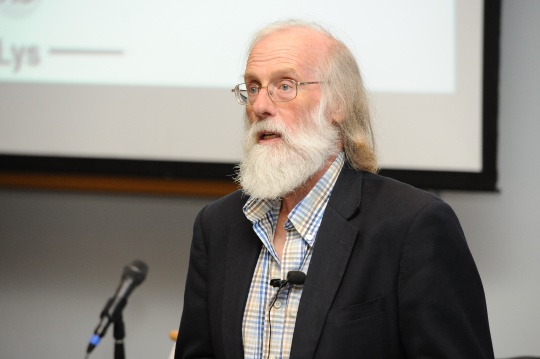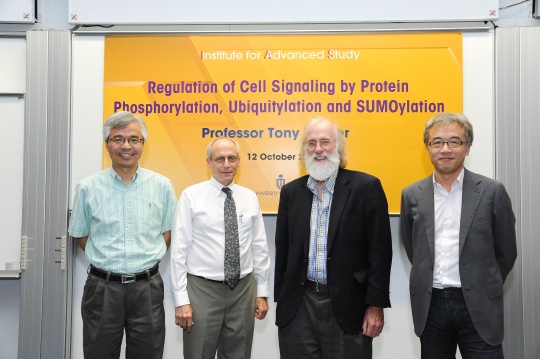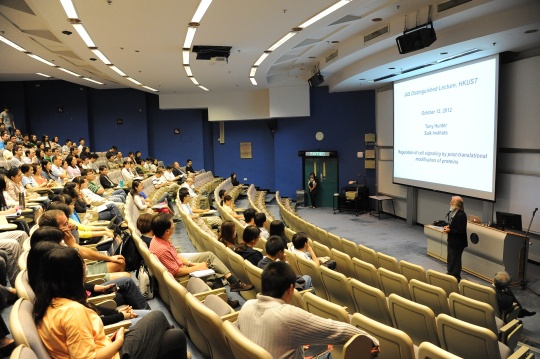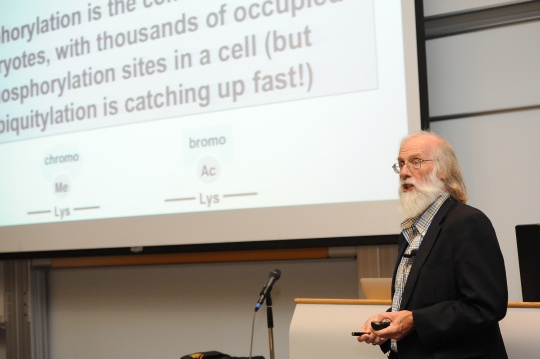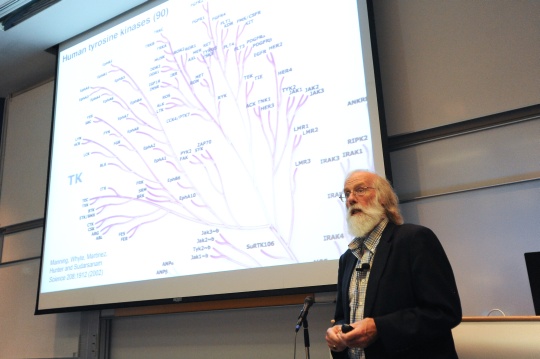Regulation of Cell Signaling by Protein Phosphorylation, Ubiquitylation and SUMOylation
Abstract
Reversible and irreversible posttranslational modifications (PTMs) are used as a means of “multiplying” the complexity of the proteome. Protein phosphorylation is involved in the majority of cellular processes and thousands of distinct phosphorylation events can be detected in a single cell type. Crosstalk between PTMs is an emerging principle, and the speaker will discuss recent work on crosstalk between phosphorylation and ubiquitylation, and between ubiquitylation and SUMOylation. The human kinome comprises 538 protein kinases of which 480 are typical eukaryotic protein kinases (ePKs), and the remainder are atypical protein kinases (aPKs); most are Ser/Thr kinases, but there are 90 Tyr kinases. Aberrant protein phosphorylation plays a role in many human diseases, and the speaker and his research group have studied newly identified cancer mutations in several protein kinases, including DAPK3, where cancer mutations lead to a loss of activity, implicating DAPK3 as a tumor suppressor. Histidine phosphorylation is becoming increasingly relevant, and two newly identified aPKs, NDPK1/Nm23-H1 and NDPK2/Nm23-H2, can phosphorylate histidine in target proteins. To study global histidine phosphorylation events the speaker and his research group have generated rabbit antibodies to noncleavable 1-pHis and 3-pHis analogues, and plan to use these antibodies to study histidine phosphorylation in transformed cells and metastasis.
Protein ubiquitylation is an abundant and increasingly important PTM that can lead to protein degradation or downstream signaling, depending on the nature of the branch point in polyubiquitin chains. RNF4 is a highly conserved eukaryotic RING domain E3 ubiquitin ligase that recognizes and ubiquitylates SUMOylated proteins through its clustered SUMO-interacting motifs (SIM); such E3 ligases are called SUMO-targeted ubiquitin ligases or STUbLs. Depletion of RNF4 impairs the cell’s response to DNA damage and results in genomic instability. The speaker and his group have also identified Arkadia/RNF111 as a second type of multi-SIM-containing RING domain STUbL, which promotes signaling through the TGFβ signaling pathway. The three clustered SIMs in Arkadia bind poly-SUMO chains and contribute to its activity in promoting TGFβ pathway signaling, and may play a role in the tumor suppressor activity of the TGFβ pathway. In particular, the SIMs are important for efficient reactivation of a TGFβ-responsive promoter silenced by DNA methylation, suggesting that mechanistically SUMO interaction facilitates Arkadia’s recognition of epigenetically repressed chromatin regions during TGFβ signaling.
About the speaker
Prof. Tony Hunter received his PhD in Biochemistry from University of Cambridge in 1969 for his work on mammalian protein synthesis. He was a Research Fellow in the Department and a Postdoctoral Fellow at the Salk Institute for Biological Studies working on polyoma virus DNA replication. He rejoined the Salk Institute as an Assistant Professor in 1975 in the Molecular and Cell Biology Laboratory. He is currently the Renato Dulbecco Chair in Cancer Research, Director of the National Cancer Institute designated Salk Institute Cancer Center, and an American Cancer Society Professor in the Molecular and Cell Biology Laboratory at the Salk Institute for Biological Studies. He is also an Adjunct Professor in the Division of Biological Sciences at the University of California at San Diego.
In 1979, Prof. Hunter discovered that polyomavirus middle T antigen and the RSV v-Src oncoprotein both exhibit a previously unknown protein kinase activity that phosphorylates tyrosine. He has spent most of the last thirty years studying protein kinases and phosphatases, and the role of protein phosphorylation in cell growth, the cell cycle, and cancer. He received numerous awards for his work on tyrosine phosphorylation.
Prof. Hunter is a Fellow of the Royal Society, an Associate Member of Excellence in the Life Sciences (EMBO), a Member of the US National Academy of Sciences, the Institute of Medicine, and the American Philosophical Society.

